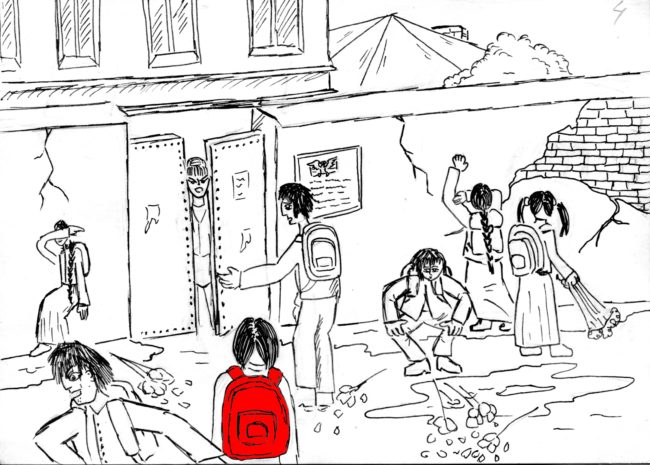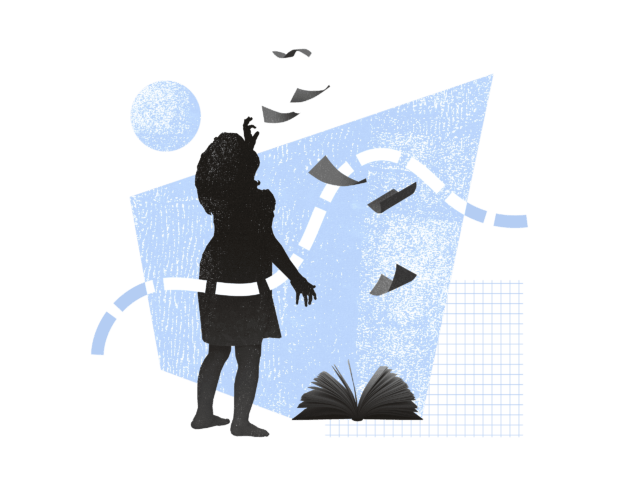If you go into any store on the eve of a new school year, you’ll immediately see stacks of brightly colored notebooks, pencils, and backpacks featuring the hero of the latest popular cartoon. Children and parents will be running agitatedly around all the stores to buy everything required for school: not just classroom materials, but also clothes and new sneakers for gym class… And these seasonal worries do not end with purchases. Parents also have to sign their children up for clubs and sometimes even extra foreign language or math classes… Mothers and fathers plan out their children’s school and extracurricular activities for the entire year and think about how they will help with homework… Loving parents do all of this with the understanding that school has a lasting effect on the shape of their children’s lives and that their future well-being depends to a great extent on their level of education.
All children must attend school. This would appear to be an indisputable truth. It is enshrined in countries’ constitutions and in the Convention on the Rights of the Child. But, in reality, this September many children will not sit down to a desk.
Few people care that Roma children are left out of school. After all, these are “other” children, “someone else’s,” “NOT OURS!” Some will disagree and say: “Well, what do you mean? I feel sorry for them. I sometimes give a beggar with her child change. Let her buy him a roll. That’s their tradition—not to go to school.” But these children need not just rolls, but an education so that at least they won’t have to beg for change to buy bread for their children. So that they can break the vicious cycle of structural discrimination. Reference to “their traditions” is merely a pretense for not having to worry about “someone else’s” children. Even if there are people who do not send their children to school for some reason—poverty, homelessness, or lack of education—society must still stand up for their children. Help them. Not leave them alone.
Many Roma children very much want to attend school, but they may be segregated from other children, given a poor education, or not accepted at all. This was the case with Alyona (not her real name), an adolescent from a tabor who was a good student and was excited to start secondary school. Unfortunately, the doors were closed to her and other children from the tabor. When these 11-year-olds started protesting under the school’s windows, the principal threatened them from behind locked gates: “We don’t have a fifth grade for Roma children, and no one will allow you in the general class. Leave before I call the police!” Did a parent from the “happy majority” stand up for these children? No—because nothing like this could happen to their own children, and these were “NOT OUR” CHILDREN.
The story is the same for migrant children: after all, these are also “other” children, “NOT OURS!” Everyone accepts that migrants are needed, that their hard work increases the receiving country’s GDP, but their children are not accepted at schools if they do not have a residence registration. Imagine a family from Central Asia that migrated to Russia to work for a better future. As soon as September rolls around, their child, like all other children, must go to school, but he is not accepted because the family does not have a regulated migration status. Will another parent go remind the principal that it is illegal to deny a child an education, that every child in Russia has the right to education under Russia’s Constitution? Generally not. The majority believe that “NOT OUR” child will make do without an education. After all, the family is at fault for not having its documents in order.
The situation is even worse for migrant children sent by the migration service to a closed “transit institution” because they do not have documents. These children, who have not committed any crime, are deprived of their liberty due to problems with their migration status. They are deprived of the right to communicate with their relatives, since these institutions are closed and high security. They are deprived of an education, since neither reception centers run by the Ministry of Internal Affairs nor the more humane transit institutions provide one. These children go unnoticed—they are “NOT OURS”—and remain outside the school system for extended periods. This is what happened to Anatoly (not his real name), who went without any schooling for the entire two years he spent in a reception center for not having documents.
Nancy Gibbs, the director of the Shorenstein Center on Media, Politics, and Public Policy at Harvard University in the United States criticized Trump’s cruel migration policy, noting that “It is not an act of particular virtue to love your children and treat them well; instinct and evolution privilege our own kids. It’s how we treat other people’s children that measures and tests us today.”
Everyone can do something to protect children in need of assistance, even if the children are not their own, by simply publicizing the problems children from vulnerable groups have accessing education. Use social media to share Alyona’s story and ADC Memorial’s #CrossborderChildhood campaign, which fights to improve the lives of migrant children in transit, like Anatoly.









 Feedback
Feedback 
